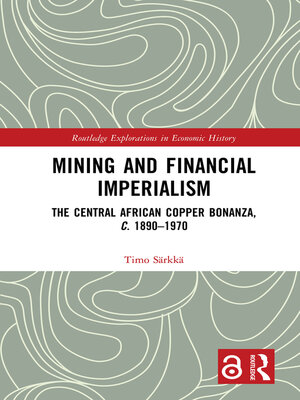Mining and Financial Imperialism
ebook ∣ The Central African Copper Bonanza, c. 1890–1970 · Routledge Explorations in Economic History
By Timo Särkkä

Sign up to save your library
With an OverDrive account, you can save your favorite libraries for at-a-glance information about availability. Find out more about OverDrive accounts.
Find this title in Libby, the library reading app by OverDrive.



Search for a digital library with this title
Title found at these libraries:
| Library Name | Distance |
|---|---|
| Loading... |
Mining finance houses were substantial public corporations with access to money markets in the City of London, the world's leading capital market for mining. These institutions became dominant at the inception of colonial rule and, in varying forms, remained so throughout the twentieth century.
Drawing on a rich corpus of primary sources, this book analyses the Western colonial origins of the mining industry and its post-colonial legacies in the Central African Copperbelt. It provides insights into the operations of the global business of mining: in particular, how these processes took place, why they were considered desirable by various interest groups, and the impact that these processes continue to have on physical and human environments in parts of the world where they took place. It also turns its gaze to the City of London looking at who the financiers were and the nature of the power which they wielded. A long-term perspective on mining finance reveals that thus far the colonial governments have been the main focus in the history of imperialism in Central Africa, with little focus in many instances on the mining finance houses which have outlived them.
The book is a significant contribution to the economic, financial and business history of mining and extractive industries, Central Africa, the City of London and early forms of financial capitalism.







